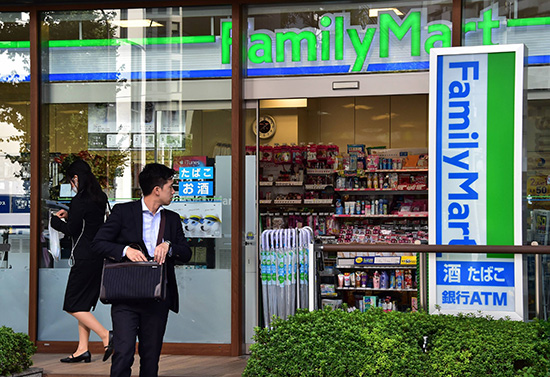全家便利店欲与中国合作伙伴分手

|
随着中国政府开始放宽零售和日用消费品等非重要行业的外资所有权限制,在中国与7-11(7-Eleven)相互竞争的日本全家便利店(FamilyMart)打算与中国的商业合作伙伴分道扬镳。 在做出决定的当下,中国的便利店市场正如火如荼。该领域的规模预计将在未来五年内增长超过60%,达到270亿美元。欧睿国际(Euromonitor International)认为,这是城市迅速发展,居民希望全天24小时都能获取食品、小吃和饮料带来的附加效应。 根据彭博社熟知内情的消息源和得到的法律文件,全家的母公司全家UNY控股(FamilyMart UNY Holdings Co.)正在通过起诉终止与顶新国际集团(Ting Hsin International Group)在中国的合作伙伴关系,它认为这家总部位于台北的集团没有公平地分享连锁店飞速扩张带来的收益。 这是最新的一起涉及中国合资企业的争端,因为中国政府对寻求进入其广大消费市场的外国公司设立了严格的限制。在2004年全家的合资企业成立时,想在中国开店,几乎所有境外公司都必须与本土公司合作。 从那以后,面对国际企业在不公平竞争方面施加的压力,中国政府放开了市场准入限制。如今,只有农业和科研等受到保护的特定领域才需要通过合资途径进入中国市场。 自此,消费巨头开始设法摆脱合资企业,从而独享自身的知名品牌带来的利益。例如,星巴克(Starbucks)就在2017年以13亿美元买断了其在华东地区作为伙伴的合资企业,这是公司当时最大的一笔交易。第二年,星巴克就联手阿里巴巴开始了咖啡快递。如今,星巴克开始与中国一家价值十亿美元的咖啡初创公司瑞幸咖啡展开竞争,这也体现了中国零售行业竞争的加剧。 按照合作协议,顶新负责让中国的2,500家全家门店有效运转,并与这家日本公司共享利润,支付特许经营费。 彭博社的消息源要求在涉及公司内部事务时保持匿名,他透露,全家在顶新与合资企业的注册地开曼群岛提起了诉讼,要求合作伙伴放弃60%的股权。 尽管顶新的创始者是台湾人,但公司在20世纪80年代末中国经济腾飞之前就进入了中国大陆,被认为是本土企业。它旗下还有其他食品和饮料品牌,包括中国领先的方便面厂商。 消息源表示,顶新称全家的特许经营费比7-11等竞争者收取的平均水平要高出三倍。 文档显示,全家声称,顶新试图把使用品牌的特许经营费从目前的1%降低至0.3%或更低,并已有七个月没有缴纳该项费用。某位人士表示,这笔费用随后已经付清。 文档显示,这家日本公司还表示,顶新并未充分披露合资企业相关的交易信息,全家日本方面无从得知合资企业的盈利情况。 位于东京的全家公司的发言人大月信介表示:“对于诉讼问题,我们目前无可奉告。”这家公司有50.1%的股权由贸易公司伊藤忠商事(Itochu Corp.)所有。顶新在邮件声明中称,由于合同保密协议,他们也不宜发表评论。 欧睿的数据显示,尽管7-11在中国的门店更多,但全家在这些日本竞争者最为成功,它的市场占有率为8.4%,销售额为170亿美元。全家在中国的占有率仅次于本土的东莞市糖酒集团有限公司,后者主要面向中国欠发达地区销售低成本产品。 尽管中国正在与美国展开贸易战,但政府也准备在2020年放开银行业和汽车制造业等领域的完全外资所有权限制,并减少强制性技术转让。欧洲巨头西门子(Siemens AG)和阿尔斯通(Alstom SA)认为,将关键技术转让给中国的合作伙伴,是它们最终在高铁建造的国际竞争上落后于中国国有企业的原因。(财富中文网) 译者:严匡正 |
Japan’s FamilyMart—a 7-Eleven competitor in China—wants to part ways with its Chinese business partners, amid loosening foreign ownership restrictions for non-critical industries such as retail and consumer goods. The move comes as China’s convenience-store market is set to grow by more than 60% to $27 billion in the next five years. That’s a byproduct of rapid urban growth and demand for around-the-clock food, snacks, and beverages, according to Euromonitor International. FamilyMart UNY Holdings Co. is suing to end its Chinese partnership with Ting Hsin International Group, saying the Taipei-based conglomerate hasn’t fairly shared gains from the chain’s rapid expansion, according to sources familiar with the matter and legal documents seen by Bloomberg. The spat is the latest tussle involving joint ventures in China because of government restrictions on foreign companies seeking access to its vast consumer market. In 2004, when the FamilyMart joint venture was formed, non-Chinese businesses were mostly not allowed to set up shop in China without a local partner. In the years since, under pressure from the global business community over an uneven playing field, Beijing has eased access and now requires joint ventures only in certain protected sectors such as agriculture and scientific research. Consumer giants since have been wriggling out of their joint ventures in order to reap the benefits of their marquee brand names for themselves. For example, in 2017, Starbucks paid $1.3 billion to buy out its East China joint venture partners in its then-biggest deal ever. The following year, Starbucks teamed up with Alibaba to deliver coffee. And in another sign of increased retail competition in China, Starbucks is now battling Luckin, a billion-dollar Chinese coffee start-up. Under terms of the partnership, Ting Hsin effectively operates more than 2,500 FamilyMart stores in China, sharing profits and paying royalties to the Japanese company. FamilyMart has filed a lawsuit in the Cayman Islands—where Ting Hsin and the joint venture are registered—to force its partner to relinquish its 60% stake, said Bloomberg sources, who asked not to be identified discussing internal company affairs. Although Ting Hsin’s founders are Taiwanese, the company has had a presence in China since the late 1980s, before the country’s economy opened up, and is considered a local entity. It also controls other food and beverage brands including China’s leading instant noodle maker. Ting Hsin argues the royalty fees are three times higher than the average charged by rivals such as 7-Eleven, according to the sources. FamilyMart alleges Ting Hsin sought to reduce the royalty fee it pays for use of the brand to 0.3% or less from the current 1% and withheld royalty payments for seven months, according to the documents. The payments were subsequently paid, one person said. The Japanese company also alleges Ting Hsin didn’t provide adequate disclosure of transactions related to the joint venture that would give FamilyMart Japan a full picture of the venture’s profitability, according to the documents. “We cannot comment on matters of litigation,” said Shinsuke Otsuki, a spokesman for Tokyo-based FamilyMart, which is 50.1%-owned by trading house Itochu Corp. Ting Hsin is not commenting due to contractual confidentiality agreements, the company said in a emailed statement. Although 7-Eleven operates more stores in China, FamilyMart has had the most success among Japanese rivals, making up 8.4% of the market’s $17 billion in sales, according to Euromonitor. FamilyMart is second only to local chain Dongguan Sugar & Wine Group Co., which sells low-cost goods in less-developed parts of the country. While it is caught up in a trade war with the U.S., China, separately, is preparing to open up sectors such as banking and auto manufacturing in 2020 to full foreign ownership, and curtail forced technology transfers. The shift of critical know-how to local partners is how European conglomerates Siemens AG and Alstom SA ultimately saw themselves out-competed globally in high-speed rail contracts by Chinese state-owned companies. |













